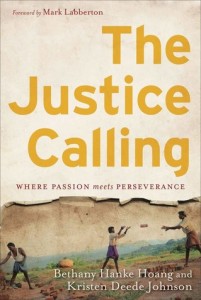The Justice Calling
The Justice Calling: Where Passion Meets Perseverance is a comprehensive biblical theology of justice that is practically engaging. Bethany Hanke Hoang and Kristen Deede Johnson bring together their deep study of scripture and their direct engagement with human trafficking and slavery, their scholarship and their activism.
To give you a glimpse of the book, here are two brief excerpts that reflect its theological richness:
“The source of justice in the midst of even the most heinous injustice in our world is Jesus Christ. God’s very character is one of justice, and he has given us Jesus as the manifestation of his justice both now and for eternity. God is the one who reveals the justice calling upon our lives, because God is the source of justice.
I have been on a journey to discover justice rooted in Jesus, to know this call that comes first from God, and to navigate the brokenness of this world with biblical hope as my sure-footed guide. Justice rooted in Jesus broke open for me the possibility and promise of persevering hope—the possibility that I could shed my paralysis and actually move forward one small step at a time because there is a God who is and will be victorious over injustice. And while God certainly could and does act on his own, God beckons us to join him, calling us into his family to be part of his work of redemption and healing through Jesus Christ and the Holy Spirit.” (pages 3-4)
“In the light of Christ, we come to see that we are all poor, wretched, helpless, and utterly dependent on God’s saving grace to rescue us. Outside the grace of God, we are incapable of getting right with God, others, ourselves, and the rest of the created world. As slaves to sin, we find it impossible to be holy, to act justly, and to love mercy, but thanks be to God that Jesus Christ came to this earth to find the lost and free the enslaved. Through Christ’s righteousness we can become righteous and be restored to right relationships. Because of this grace, we can live the way of life God intended for his holy people, the way of justice and righteousness, the way of shalom.” (page 28)
I appreciate how Bethany and Kristen explore the convergence of justice and spirit formation. This excerpt from an interview with them capture this well:
You speak about this idea of moving into the darkness, how would you encourage someone who longs to do so but is paralyzed by fear?
Bethany: I think there is a temptation to despair or even to be apathetic and draw back and embrace cynicism rather than believing anything can change or holding onto hope. What we learn from the prophets, especially Habakkuk, is that we can contend with God. We can argue, wine, ask questions of God, and we can know that He sees everything we see in a far more specific and complete scale than we ever could. He invites us to bring our questions to him and to wrestle with him. Just the act of questioning, rather than an affront to God—even if we are angry, is still us coming to God. And God longs for you to talk to him and tell him all the details, to leave nothing spared of what weighs on you and to let him enter into it with you. There is a beauty that he brings from even the most devastating ashes.
Throughout the book, justice work is defined as being long and hard, what would you say to someone who is burnt out from justice work?
Kristen: We know that burn out is very common for those who long to see justice in this world. That’s a big reason we wanted to write this book–to explore what it would take to seek justice as people with deep roots that are sustained and nurtured by the living waters of Jesus Christ. We believe that what we do is supposed to flow from who we are – so that our work of justice, ideally, flows from the grace we have been given in and through Jesus Christ that enables us to become God’s children. This same savior, Jesus Christ, is the one responsible for reconciling all things (Col 1:20). We are invited to share God’s ongoing commitment to reconciliation and justice, but this work ultimately depends upon God, not us. We hope that by looking deeply at God’s commitment to justice and righteousness throughout the whole story of Scripture and by being reminded of the centrality of Jesus Christ for the reconciliation of all things, you might find strength to continue on in the journey. We hope that the practices of Sabbath, lament, worship, and Eucharist might be ways the Spirit can revive you as you are reminded of the beauty of God’s vision for the world along with your own identity in Christ and your reliance on him for all things.
Click to download a free sampler of Chapter 1.
